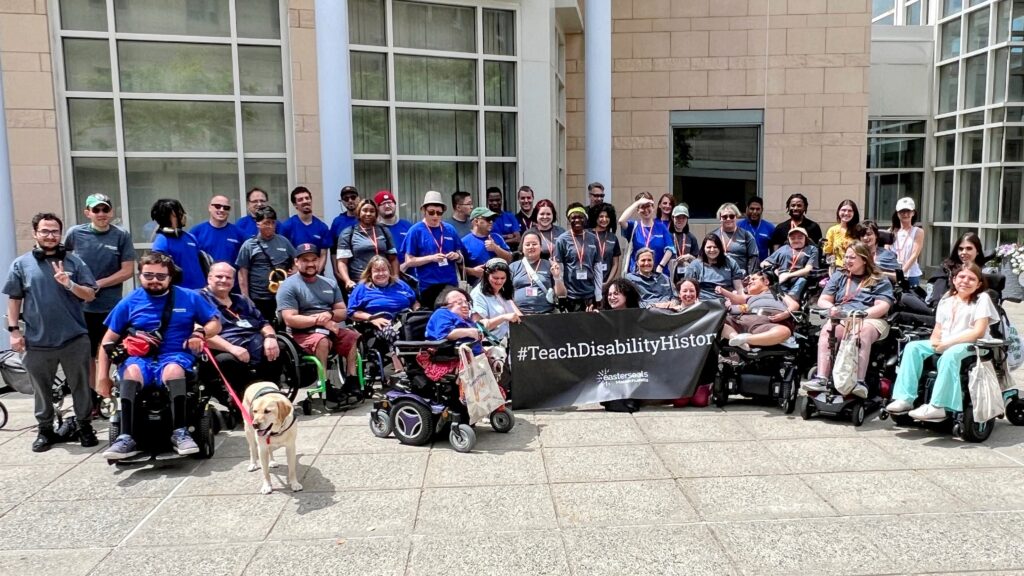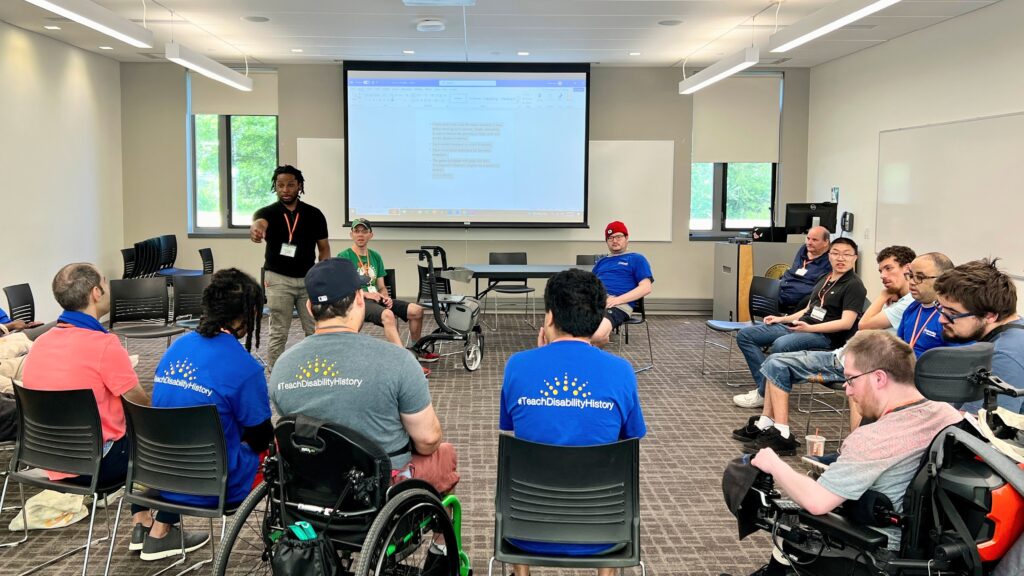
Frequently Asked Questions About Respite
1. What is respite?
Respite is a temporary break for caregivers from their regular caregiving responsibilities. These breaks can allow caregivers to do things they would not otherwise have time for or be able to do. Examples of respite include: going on vacation, running errands, taking time to read a book or go to the movies, and visiting with family and friends.
2. Where does respite take place?
Respite can be provided in a variety of settings. Caregivers can select the type that best suits their needs as well as the needs of their loved one. Examples include: at home, a child or day care center, a day program, a camp setting, or a residential facility.
3. Who provides respite care?
Respite can be provided by someone the caregiver trusts, i.e. a friend, a neighbor, an adult child, etc. If you need help finding additional sources of respite care, the Delaware Aging and Disability Resource Center website has a searchable database of provider agencies.
Click this link: http://www.delawareadrc.com/ At this time, Delaware does not support a database of individual respite providers.
4. Can I get financial assistance to help fund respite care?
Yes, you can. We help families fund respite through our respite voucher program. We have three Easterseals respite programs at this time:
- Child and Adolescent Caregiver Respite: supports families raising children under 18 years of age who have a qualifying behavioral or mental health issue, learning disability, or developmental disability
- Lifespan Respite: provides grants to caregivers caring for a loved one of any age with a special need, disability, or aging condition who meets the eligibility requirements
- Relative Respite: helps grandparents and other non-parent relatives 55 or older raising a child or children under the age of 18
5. Who is eligible to receive grant funding through the Easterseals respite programs?
You are eligible to apply for a voucher if:
- You and the person to whom you provide care are Delaware residents
- You are providing unpaid care to the person
- You do not receive respite funding from another agency or program
7. Are there other sources of financial assistance available to help me afford respite care?
There may be. Each respite applicant is contacted by one of our Case Managers, whether they are approved for funding or not. However, you may contact our Case Managers, even if you choose not to apply for respite funding, by email at resources@esdel.org or in our New Castle office at 302-221-2076 or our Georgetown office at 302-253-1129.
Support & Education
Our blog
-
Empowering Disabled Adults Through Community: Weekend Retreat at Easterseals Massachusetts
Thursday, July 25, 2024, 4:57 PMEmpowering Disabled Adults Through Community: Weekend Retreat at Easterseals Massachusetts
Thursday, July 25, 2024, 4:57 PM
By Grant Stoner Last month, Easterseals Massachusetts celebrated its annual mentorship retreat for y…
Read this Post
By Grant Stoner
Last month, Easterseals Massachusetts celebrated its annual mentorship retreat for young adults with disabilities. The Empowering You 2024 Mentorship Retreat featured activities and events like workshops emphasizing community building, handcrafted art, games, and several guest speakers. For disabled individuals living in Massachusetts, this annual event encouraged embracing your disabled identity, building support throughout your community, and, more importantly, the capability to confidently and comfortably empower oneself.
Empowering You is the culmination of efforts from Easterseals Massachusetts’ mentorship programs Thrive and Brothers Against Discrimination (B.A.D). While Thrive is specifically for disabled young women, and B.A.D for young men, both groups seek to help disabled members promote and advocate for themselves as confident disabled members of society. I spoke with Easterseals Massachusetts Youth Program Manager, Desi Forte, who explored this year’s mentorship retreat theme and its varying activities, the importance of accommodating numerous disabilities, and her hopes for the future.
What Is Empowering You?
Confidence and self-worth are important tools for any individual. Yet, for disabled people that may struggle to feel welcome in a society that can still pose numerous inaccessible barriers, as well as general notions of ableism, empowerment is crucial for daily living. While Thrive and B.A.D regularly develop programs to create and refine self-help skills, Forte explains it was important to have the annual retreat focus on the overall theme of empowerment.

“The focus of the program was really around empowering people with disabilities by creating these communities,” Forte said. “With the theme of Empowering You, we were trying to find an all-encompassing theme that was broad in terms of scope of what we could cover. Really emphasizing the point around empowerment because that’s what these programs were built to do.”
The annual mentorship retreat took place over a weekend to allow attendees time to engage with activities. Forte notes that the Friday and Saturday were primarily reserved for members of B.A.D, while Thrive members met on Saturday and Sunday, with intentional overlap on Saturday for both groups to connect with one another. Forte explains that approximately 18 attendees within each program stayed for the event, with ages ranging from 15 to adults in their 50s. Yet, despite the vast differences in age, the event provided activities for all to enjoy.
“There were activities around the theme of empowerment,” she said. “There was an art activity where individuals created prints just showing what empowerment means to them. There were speakers around leadership within the disability community and beyond, and how they can be leaders in their lives. There was a lot of structured down-time as a way for these community members to connect with one another to build organic mentoring and empowering relationships from the different generational communities being able to connect with one another.”
Empowering Through Care
Each annual mentorship retreat brings attendees to new locations, and Empowering You was no different. Hosted at Bridgewater State University, members and volunteers were given access to the facilities of the college campus, including residential halls. While this was a great way to directly bring disabled individuals into local communities, it also provided its own logistical challenges.
For many disabled people, traveling, and especially staying overnight, can be a complex process. From transferring medical equipment to extensive care regimes, many disabled individuals do not have the luxury to temporarily bring their care to other areas. Thankfully, Forte notes that the event was able to comfortably and successfully accommodate everyone.
 “One of the strongest positive outcomes we always see, is that because this was an overnight event, we were able to support [Personal Care Assistant] needs if that’s something participants need to be involved,” she said. “[We also provide] other needs they may have that may be a barrier for them to participate in other overnight events. Just getting a chance to be overnight, away from their everyday environment, is always a strong part of this program.”
“One of the strongest positive outcomes we always see, is that because this was an overnight event, we were able to support [Personal Care Assistant] needs if that’s something participants need to be involved,” she said. “[We also provide] other needs they may have that may be a barrier for them to participate in other overnight events. Just getting a chance to be overnight, away from their everyday environment, is always a strong part of this program.”Some attendees, as Forte explains, are experiencing their first overnight event. And for others, these retreats are something to look forward to annually, allowing disabled individuals to connect with peers, as well as comfortably and confidently spend significant time away from their home environment. Forte notes that one of the most common pieces of feedback after each event is the joy with being able to stay overnight. “The feedback that we’ve gotten many, many times, and this year especially, is just being able to be in the space is something that those involved don’t get the opportunity to do very often.”
Moving Forward
Empowering You was not the only event available this year. Forte notes that Easterseals Massachusetts consistently offers numerous events and retreats, both virtually and physically, for disabled attendees and mentors alike. For disabled individuals, these create opportunities to build not only self-confidence, but a sense of community, something crucial for marginalized groups like disabled people. And as each event draws to a close, Forte is hopeful that they will continue with new themes and places.
“The hopes for future events are to just keep them going and to keep them growing,” she said. “To be able to keep doing these and offering these opportunities. The only concerns are always around funding and making sure that that’s available to support these programs, and to support these opportunities.”
Empowering You more than embraced its theme. The intersections of different mentorship groups, community building, and creating necessary tools to empower oneself were felt across the college campus. For disabled individuals, finding a sense of belonging internally, as well as through a community, are crucial components of long-term care. Without community, disabled people may struggle to engage within a traditionally nondisabled society. And while these events continue, self-empowerment and connecting with others will provide even more opportunities for disabled individuals to develop a sense of belonging. And as Forte explains, these retreats and events are integral to the disabled community.
“As a person with a disability myself, I completely understand firsthand what being involved in these programs means,” she said. “And really, what it means for me to be able to give back to this community that means so much to me.”
To learn more about Easterseals Massachusetts, please visit their website.
-
Taking Charge of Your Story: Why Representation Matters
Tuesday, July 23, 2024, 11:35 AM
By Christina Gann The first time I ever encountered a queer narrative in a video game was The Last o…
Read this Post
By Christina Gann
The first time I ever encountered a queer narrative in a video game was The Last of Us in 2013. The main game was released in June during LGBTQIA Pride month but did not include an openly queer narrative released in the main story playthrough. It was a prequel, an add-on character story that you needed to purchase separately after the release of the main game. When I started up that game, I had no idea that the story they were going to include for the main character Ellie William would have such a profound impact on me. The story took you on a heartfelt journey with Ellie’s best friend Riley that concluded with Ellie’s first kiss … and she kissed *gasp* Riley?! … another girl!
I was over the moon. I couldn’t hold back my tears and felt a sense of connection to this story and to the world around me in that instance. I cried because I felt validated and connected to this storytelling even if I had never experienced a queer teen romance of my own. Ellie was me. Teen romances are universal, a part of the human experience. To look for companionship and emotional security in another person is an experience that surpasses color, sexuality, ability and telling stories that include these universal experiences with diversity and inclusion weaves a tapestry interconnecting us as humans.
As rare as the queer perspective is in video games, good representation of people with disabilities is even rarer. Rich, diverse stories of characters with disabilities are desperately needed in mainstream media. Accurate representation is key to destroying limiting beliefs about the lives of people with disabilities. Stereotypes and false beliefs created by misrepresentation give a false impression of what it’s like to live in the world with a disability, creating disconnect and isolation. Disability is still regularly served up as a trope to invoke fear in the horror genre in both video games and cinema. Sending a message that disabled people should invoke fear instead of celebrating the life of the individual and the way they approach the world in different ways. This needs to be replaced with characters and stories that resonate differences to be celebrated.
 When I was a young adult, my family and I would go to medical conventions to learn new information and technologies that could help accommodate my needs while living with short gut syndrome. Short gut syndrome is so rare that these conventions were the only way that I ever got to see or meet other people who lived a similar experience to my own. I felt included, accepted and understood more there than anywhere else. Meeting all these young people like me who had the same challenges, the same desires, same hopes made me see that it was all possible if I was allowed to exist without the constraints and limitations put on me.
When I was a young adult, my family and I would go to medical conventions to learn new information and technologies that could help accommodate my needs while living with short gut syndrome. Short gut syndrome is so rare that these conventions were the only way that I ever got to see or meet other people who lived a similar experience to my own. I felt included, accepted and understood more there than anywhere else. Meeting all these young people like me who had the same challenges, the same desires, same hopes made me see that it was all possible if I was allowed to exist without the constraints and limitations put on me. Seeing representation of yourself is healing, especially when you exist outside the boundaries of the status quo. To be able to relate and identify with the rest of the world is profoundly interconnecting. Everyone wants to feel seen, everyone thirsts to be understood and accepted as they are. When we tell stories with accurate representation, we create an understanding, and through understanding, we create unity. The stories we tell, the way in which we represent ourselves to each other is so vital to the way in which we relate to each other face to face.
We believe what we see and this becomes our reality. I was taught at a very young age that being different meant danger. That being disabled meant that you were limited in what was possible. That accepting disability meant accepting defeat. I grew up as a witness to a world that mistreated, misrepresented and abandoned the disabled. I struggled to relate what I saw to how I felt growing up disabled. I didn’t feel like I was limited but that the world was not made for people like me. I remember going into my school counselor’s office and being told what I was capable of achieving. What was possible and what was not going to happen for me given the limitations she created for me out of assumptions fueled by societal views. I was force fed my limitations on a platter with no exceptions. Without allowing me to determine my path and how I would approach life in my own unique way. Without giving me a chance to thrive.
I went on to dismantle every limit put in front of me. I have done things I was told were impossible.
Someone told my story, someone else limited my potential and capabilities without my permission. No one should have their story stolen or misrepresented. Misrepresentation creates false images and harmful stereotypes of people and their lived experiences. We are still fighting for accurate representation at the intersection of queer and disabled. To have a hand in telling our own stories is vital to diverse and suitable representation that changes how we are viewed and treated in the world.
When we leave room for all stories to be told, we open the door to alternate reality, one that aligns with our humanity, compassion and understanding. No one should have their story or their potential snatched away. We all deserve the chance to thrive and live out loud and proud of all that makes us who we are. Diversity, accurate representation and inclusion bridges the gap between what we think we know about each other and what connects us to each other, including us all in the conversation.
Advocacy makes our stories and existence visible and we are infused back into the pack as one community supporting one another through our individual experiences. When you are ready, tell your story as loudly as you can because I assure you, someone out there needs it so that they can have the courage to tell their own.
Christina Gann is a content creator, artist, and scientist based in Colorado. They love horror movies, gaming with friends, and their dog, Oreo. You can follow Christina on Twitch, TikTok, Instagram, and X.
Read Christina’s other blog, Finding Pride at the Intersection of Disabled and Queer.
-
Disability Pride, Queer Pride, and the Medical Model
Thursday, July 18, 2024, 12:27 PM
By Mids Meinberg As we enter into Disability Pride Month, I believe it is important to think about t…
Read this Post
By Mids Meinberg
As we enter into Disability Pride Month, I believe it is important to think about the ways that disability and queer rights have similar struggles. In particular, both have a history of navigating the divide between the medical and social models.
The medical model is the more traditional model for thinking about both disability and queerness. Essentially, it proposes that these are medical conditions that require treatment and, ideally, a cure. The social model, in contrast, proposes that disability and queerness are both identities, which exist to be embraced — not erased.
Psychology is a relatively young science, but in its foundational texts, homosexuality is described as a mental pathology. Within the first DSM, released in 1952, homosexuality is placed in the same category as pedophilia and sadism. The DSM-II, originally released in 1968, kept homosexuality as a mental illness, but only during the first six printings. (Psychiatry.org)
Between the sixth and seventh printing, the gay liberation movement had begun in earnest, spurned by the famous Stonewall riots that led to the creation of queer Pride. As the movement gathered strength, it led to the seventh printing (in 1973), revising the description of homosexuality to no longer describe it alone as a psychiatric disorder. It did, however, maintain that a person with homosexual desires was a person who needed treatment.
This would remain the stance of the DSM until the DSM-5, released in 2013.
While queer Pride began in 1970, starting on the anniversary of the Stonewall riots, Disability Pride did not begin until 1990, in celebration of the passing of the Americans with Disabilities Act. It did not begin to have widespread celebration until the early 2010s, and is still not nationally recognized.

Photo from Disabled and Here, photographed by Chona Kasinger.
Despite the successes of the struggle for the rights of both disabled and queer people, there is still much to go to assure full equality for both groups. The medical model is still in common practice for many disabilities, and indeed is held by some disabled people as well. Our society creates barriers for disabled people despite the laws passed like the ADA, preventing disabled people from being able to live their lives to the fullest. And while the blame lies on these barriers, disabled people are constantly told that it is their disability at fault.
Queer people have resisted the medical model since it was first applied to them, and efforts to pathologize queerness have always been rooted in discrimination and hatred towards queer people. Despite this rejection of the medical model, some queer people do require medical technology in order to best fit their desired identities, which is most visible in trans people.
While it is entirely possible to transition one’s gender without the use of any medical tools, options like HRT, gender-affirmation surgery, and facial remodeling are very useful in helping a trans person to fully identify as their true gender. This use of medicine does not mean that the medical model applies to trans people, though.

Meinberg
I use medicine to help ameliorate my depression and anxiety, but this does not mean that my depression and anxiety are inherently medical issues. If I lived in a society that was more accommodating of depressed people or anxious people, I might require less medication. But even if I chose to continue using medication, that is merely my choice in how to best navigate my neurodivergence so that I can truly be myself.
I would never want to be cured completely of my depression. For all of the troubles it has caused me, it is still a part of me and a part I am deeply proud of how it has helped to shape me into becoming a better person. The idea that I would be better off if I had never had depression is simply incorrect. Some depressed people feel differently though, and that is a valid perspective to have. There is no denying, though, the transformative effect of having a disability.
Similarly, there are some trans people who wish they were assigned the correct gender at birth. Transitioning is difficult due to large social barriers and lack of affordable access to necessary treatments, and being assigned the correct gender at birth is much easier. However, nearly all transpeople are happy that they have transitioned and the important part is that they have become who they wish to be. (Gender GP) In addition, for many trans people I know, their transition is an important part of their identity — not simply being the right gender, but being a trans person of the right gender.
This is because these trans people are able to find community together via their transness and are able to develop new models of looking at their gender via the lens of being trans, much in the same way that people with queer sexualities look at relationships differently and are able to form different kinds of romantic and sexual bonds because they are not the default.
As disabled people, we can apply many of these lessons that queer people have learned to our own struggles and our own identities and learn how best to create a space in the world for us. The social model recognizes that disability is a part of disabled people’s lives and it changes us, not necessarily for better or for worse, but into who we truly are. Even if I were to no longer experience any symptoms of depression, I would still have been shaped by that depression and I cannot write it off of my identity.
An ableist society seeks to shame us for our disabilities, seeking to reinstate the ugly laws and push us away from visibility, to pretend like we don’t exist – and that when we do exist, our disabilities are problems to be solved. For a very long time, this was also the case for queer people; society wished for queer people to be put back into the closet, to be denied their existence and their rights. But like queer people, disabled people have continued to fight, and so long as we have pride in our hearts and know that we deserve to exist, to be seen, to be counted as equals no matter what society has to say, we will push forward into a better tomorrow.
Happy Disability Pride, everyone.
Mids Meinberg is a writer and game designer working out of New Jersey. They have an AA in Creative Writing from Brookdale Community College.
-
My Disability is Part of My Story
Monday, July 15, 2024, 11:08 AM
By Liz Meckes, Director of Development, Easterseals Southeastern Pennsylvania Surprise! I have a pr…
Read this Post
By Liz Meckes, Director of Development, Easterseals Southeastern Pennsylvania
Surprise! I have a prosthetic eye – that I choose not to wear.
After losing my left eye to cancer in 2022, I had various eye patches for 6 months while my face healed. When I healed enough, we started the process for a prosthetic. My sticker, as my 4-year-old calls it, is beautiful. It looks incredibly realistic although the eyeball doesn’t move.
They put the final product on my face in June 2024. I thanked them, walked out of the doctor’s office, and broke-down.

Covering my “socket” as we call where my left eye used to be, was an overwhelming reminder of what I lost. Of what I had to fight. Of what I’m still fighting and recovering from. It felt like I was hiding.My face, my scars, they are part of my story.
Do I get stared at? Yes. Do I love kids asking, “why do you have one eye” at daycare drop-off, at the playground, and at family gatherings? No.
Do I want to hide my face, my disability? NO!
SUPPORT YOUR KIDS IN ASKING QUESTIONS! I have the privilege of helping children be more inclusive, accepting, and engaging by answering their questions. That kid on the playground that is different – more times than not, they would rather be asked a question than avoided and ignored.
Let your kids ask questions, even when it’s uncomfortable for you. Teach them to satisfy their curiosity about differences while asking what they have in common with others.
When I answer kids, I acknowledge that I had something hurting me, that we said goodbye to my eye and now I don’t hurt. But, even though I only have one eye, I love baseball, swimming, riding bikes, reading, and playing with my son. I ask them if their hair is straight and note mine is curly. We are all different and that’s okay.
July is Disability Pride Month. Celebrate with me by building an inclusive society that does not isolate, disrespect, ignore, and limit the potential of all community members.
Liz Meckes is a dedicated nonprofit fundraising executive, known for her enthusiasm for people and her deep love for Philadelphia sports teams. Her career began with creating memorable fan experiences for the Philadelphia Freedoms of World Team Tennis. This passion for connecting with people naturally led her to a career in fundraising, where she has excelled in building relationships at Easterseals. Diagnosed with an invisible disability, Crohn’s disease, in her teens, causing chronic fatigue and nutritional challenges, and eventually leading to kidney failure. After receiving a kidney transplant in 2014, she went on to have her son in 2020. In 2021 and 2022, she faced squamous cell carcinoma in her left temple sensory nerve, resulting in the loss of her left eye. She is adapting to single-eye vision and proud to continue to be a member, ally and advocate for the disability community.
-
Becoming a Chef at Easterseals South Florida’s Culinary Arts Program
Thursday, July 11, 2024, 4:03 PMBecoming a Chef at Easterseals South Florida’s Culinary Arts Program
Thursday, July 11, 2024, 4:03 PM
Sebastian Millan loves to cook Italian dishes like pasta and pizza. He also enjoys making Cuban food…
Read this PostSebastian Millan loves to cook Italian dishes like pasta and pizza. He also enjoys making Cuban food like arroz con pollo, pulling from his own heritage. In 2021 at the Easterseals South Florida Youth Culinary Arts Summer Camp, Sebastian discovered a passion for cooking, learning skills needed to craft a diverse range of cuisines.

Sebastian
The Youth Culinary Arts Summer Camp is a seven-week program for students with disabilities, including autism, in grades 6 to 12. Participants like Sebastian train hands-on with experts in the culinary arts, learning practical job knowledge and financial literacy to aid them in transitioning from school to employment and independence. The Easterseals Academy staff noted how Sebastian’s work in the kitchen has helped him excel in math and build leadership skills.
Easterseals South Florida offers many opportunities for educating youth during their summer camps, including field trips that include experiential learning. “We’re always seeking site partners that specialize in sensory opportunities and other enrichment offerings. So the students enjoy a lot of outdoor and indoor field trips. They bring back a great deal of knowledge and gratitude. They get to work with animals, they get to enjoy performances…so it’s very fulfilling and very diverse,” says Pietro Bonacossa, Vice President of Development.
After summer camp ended, Sebastian wanted to continue cooking. He then joined the Easterseals Culinary Arts High School Program, which also includes the hands-on training from summer camp alongside traditional classroom instruction. Academic content follows the B.E.S.T. (Benchmarks for Excellent Student Thinking) Standards and is tailored to meet individual student needs. Students can work together in small groups on different stations, like sanitation, food prep, and food service. They also have the opportunity to earn a ServStaff sanitation certification and learn Culinary Arts skills following the ProStart Curriculum. High school graduates can stay enrolled in the program until the age of 22.
 Through the support of the Easterseals family, Sebastian started an internship last year at Nicklaus Children’s Hospital in Miami, working in their dining services department. He’s gained further skills in customer service, food prep, and creative food presentations. Earlier this year, the hospital hired him part time with benefits, and he is now working full time for the summer.
Through the support of the Easterseals family, Sebastian started an internship last year at Nicklaus Children’s Hospital in Miami, working in their dining services department. He’s gained further skills in customer service, food prep, and creative food presentations. Earlier this year, the hospital hired him part time with benefits, and he is now working full time for the summer. Sebastian is but one example of the importance in creating inclusive, equitable spaces where people with disabilities can learn and thrive alongside their peers, gaining tools that foster independence and teamwork.
Sebastian shared that his favorite part of being a chef is the collaboration between everyone that works in the kitchen, and being able to simply do what he loves with the support that he needs. Sebastian’s dream is to own a breakfast food truck. If that’s successful, he wants to open his own restaurant. He said, “The people at Easterseals have a future, they can learn new abilities to have their own future and follow their dreams.”
To learn more about the incredible work of Easterseals South Florida, visit their website. Thank you to Sebastian Millan and Pietro Bonacossa for their contributions to this blog post.
Let's Keep in Touch
Don't miss out on exciting news, helpful resources, and impactful stories delivered to your inbox each month.
Join Today
